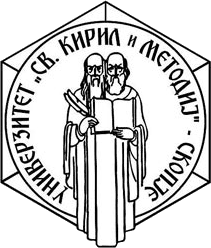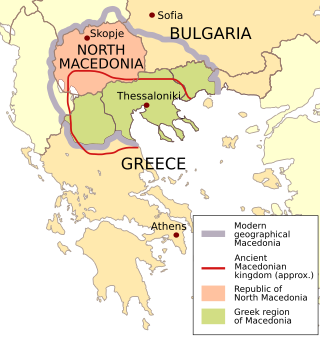Related Research Articles

Ambassadors of the United States are persons nominated by the president to serve as the country's diplomatic representatives to foreign nations, international organizations, and as ambassadors-at-large. Under Article II, Section 2 of the U.S. Constitution, their appointment must be confirmed by the United States Senate; while an ambassador may be appointed during a recess, they can serve only until the end of the next session of Congress, unless subsequently confirmed.

The Saints Cyril and Methodius University in Skopje is the oldest and largest public university in North Macedonia. It is named after the Byzantine Christian theologians and missionaries Cyril and Methodius. As of 2018–19 school year, a total of 25,220 students are enrolled at the university. Furthermore, the teaching and research staff number 2,390 people; this is further supported by over 300 members in the university's institutions.

Nikola Gruevski is a former Macedonian politician who served as Prime Minister of Macedonia from 2006 until his resignation, which was caused by the 2016 Macedonian protests, and led the VMRO-DPMNE party from 2004 to 2017.

Vitaly Ivanovich Churkin was a Russian diplomat. As a child actor, he starred in three films The Blue Notebook, Nol tri, and A Mother's Heart. Churkin served as Russia's Permanent Representative to the United Nations from 2006 until his death in 2017.

The use of the country name "Macedonia" was disputed between Greece and the Republic of Macedonia between 1991 and 2019. The dispute was a source of instability in the Western Balkans for 25 years. It was resolved through negotiations between Athens and Skopje, mediated by the United Nations, resulting in the Prespa agreement, which was signed on 17 June 2018. Pertinent to its background is an early 20th-century multifaceted dispute and armed conflict that formed part of the background to the Balkan Wars. The specific naming dispute, although an existing issue in Yugoslav–Greek relations since World War II, was reignited after the breakup of Yugoslavia and the newly-gained independence of the former Socialist Republic of Macedonia in 1991. Since then, it was an ongoing issue in bilateral and international relations until it was settled with the Prespa agreement in June 2018, the subsequent ratification by the Macedonian and Greek parliaments in late 2018 and early 2019 respectively, and the official renaming of Macedonia to North Macedonia in February 2019.

Relations between Bulgaria and the United States were first formally established in 1903, have moved from missionary activity and American support for Bulgarian independence in the late 19th century to the growth of trade and commerce in the early 20th century, to reluctant hostility during World War I and open war and bombardment in World War II, to ideological confrontation during the Cold War, to partnership with the United States in the North Atlantic Treaty Organization (NATO) and growing political, military and economic ties in the beginning of the 21st century.

Zoran Jolevski is a Macedonian diplomat and the former Minister of Defense of the Republic of Macedonia. Prior to his appointment as Minister of Defense, he served as Macedonia's Ambassador to the United States of America. In November 2008, he was appointed chief negotiator to the Macedonia naming dispute, and in 2011 he was appointed Ambassador to the United Mexican States and as Permanent Representative to the Organization of American States. He served as Secretary General of the late Macedonian president Boris Trajkovski from 2000–2004. He holds a Ph.D. in International Economy from Ss. Cyril and Methodius University of Skopje. He is married to Suzana Jolevska, and together they have two sons, Pero (1988) and Filip (1992).

The United States and North Macedonia enjoy excellent bilateral relations.

North Macedonia–Russia relations are bilateral relations between the Republic of North Macedonia and the Russian Federation. North Macedonia has an embassy in Moscow and a consulate in St. Petersburg, while Russia has an embassy in Skopje and consulates in Bitola and Ohrid. Chargé d'Affaires of North Macedonia in Moscow is Olivera Čauševska-Dimovska, while the Russian ambassador in Skopje is Sergey Bazdnikin.

Ray Atherton was a career United States diplomat, who served as Ambassador to Greece, Bulgaria, and Denmark. He also served the role of Head of Mission as Envoy Extraordinary and Minister Plenipotentiary (Canada) (1943–48). Whilst in his last post, his role was reclassified and he became the first United States Ambassador to Canada. As Head of the State Department's Division of European Affairs he received notification from the German Embassy of their declaration of war on December 11, 1941.

The Embassy of Libya in Washington, D.C. is the diplomatic mission of Libya to the United States. It is located at 1460 Dahlia Street NW Washington, DC 20012.

Nikola Dimitrov is a Macedonian politician and diplomat, who has served as Minister of Foreign Affairs for North Macedonia from 31 May 2017 to 30 August 2020. He also served as Deputy Minister of Foreign Affairs in 2000 and Macedonian ambassador to the United States and then the Netherlands. In 2014, he turned down an appointment as Macedonia's new ambassador to Russia.

India–North Macedonia relations are the bilateral relations between India and North Macedonia.

Vasko Naumovski is a Macedonian diplomat and politician of VMRO-DPMNE, having served as a Deputy Prime Minister of the Republic of North Macedonia in Nikola Gruevski's government for the period of 2009–2011, responsible for the country's European integration.
Petar Zdravkovski – Penko (November 4, 1912, Prilep, Ottoman Empire – July 26, 1967 Beirut, Lebanon) – educator, statesman, diplomat.

Kate Marie Byrnes is an American diplomat, who served as the United States ambassador to North Macedonia between July 2019 and September 2022. She is a career diplomat who has received many awards for her service.

Angela Price Aggeler is an American diplomat who is the United States ambassador to North Macedonia.
References
- 1 2 3 4 5 Halsell, Grace (September–October 1994). "Republic of Macedonia's U.S. Representative Grew Up in Ohio". Washington Report. Retrieved 25 February 2014.
- 1 2 3 "Ohioan answers Macedonia's call". Eugene Register-Guard/The Associated Press. 28 June 1999. Retrieved 25 February 2014.
- ↑ Sephocle, Marilyn (2000). Then, They Were Twelve: The Women of Washington's Embassy Row. Greenwood Publishing. ISBN 9780275968335.
- 1 2 3 4 5 Luxner, Larry (1997). "Service to Country and Humanity: Macedonia's Ljubica Z. Acevska". The Washington Diplomat. Retrieved 25 February 2014.
- 1 2 3 4 5 6 7 8 9 De Witt, Karen (15 July 1993). "Balkan Envoy To U.S. Gets New Respect". The New York Times. Retrieved 25 February 2014.
- ↑ "Supplemental Statement Pursuant to Section 2 of the Foreign Agents Registration Act of 1938, as amended" (PDF). United States: Department of Justice. 31 July 1992. Retrieved 25 February 2014.
- ↑ Diplomatic and Consular Immunity (PDF). United States: Department of State. July 2011. Retrieved 25 February 2014.
- ↑ Shor, Donna (September 1999). "Around Town". Washington Life. Retrieved 24 February 2014.
- ↑ Sephocle 2000 , p. 118
- ↑ Luxner, Larry (December 2004). "Macedonia's Nikola Dimitrov: No more FYROM". The Washington Diplomat. Archived from the original on 4 March 2016. Retrieved 24 February 2014.
- ↑ "NATO Enlargement at Risk: The Athens-Skopje Dispute". Woodrow Wilson International Center for Scholars. 28 March 2008. Retrieved 25 February 2014.
- ↑ Velkovska, Julija (6 March 2010). "Љубица Ачевска во хуманитарна мисија во Хаити" [Ljubica Acevska on humanitarian mission to Haiti]. Voice of America. Retrieved 25 February 2014.
- ↑ "Embassy Row: Women's work". The Washington Times. 10 April 2000. Retrieved 24 February 2014.